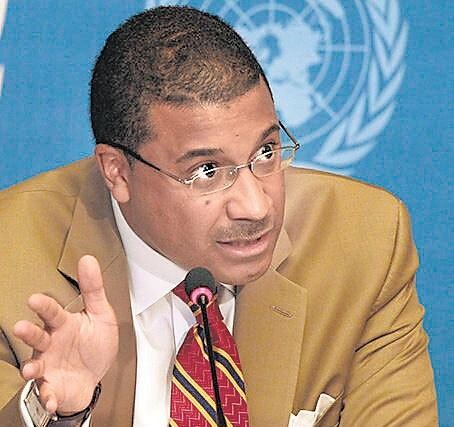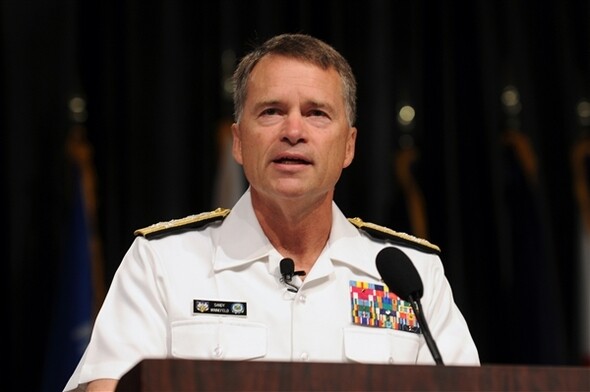hankyoreh
Links to other country sites 다른 나라 사이트 링크
THAAD again bubbling up as a political issue

Senior US officials are once again talking about the deployment of a Terminal High Altitude Area Defense (THAAD) system on the Korean Peninsula.
After remarks on the issue from Secretary of State John Kerry on May 18, now the Assistant Secretary of State and Joint Chiefs of Staff Vice Chairman have added to the mounting pressure on Seoul with calls for the permanent deployment of the missile defense system in South Korea. The comments are being seen by some as a renewed push in the wake of North Korea’s recent test launch of a submarine-launched ballistic missile (SLBM).
For now, Seoul has remained on the sidelines, repeating its previous position that it will consider the matter once the US asks it to do so. But that position is suspected of having a hidden agenda behind the “strategic ambiguity,” arguing that the administration has already made its mind to accept the THAAD deployment but remains publicly noncommittal out of concerns about domestic and international opinion.
Speaking at a debate organized by the Institute for Corean-American Studies (ICAS) at the US Capitol on May 19, assistant secretary of state for arms control, verification, and compliance Frank Rose stressed, “Although we’re considering the permanent stationing of a THAAD unit on the Korean Peninsula, we have not made a final decision and we’ve had no formal consultations with the Republic of Korea on a potential THAAD deployment.”
Rose’s remarks were taken as a sign that the US administration is abandoning its caution on the South Korean THAAD deployment issue and moving actively to bring it into public debate. While senior State and Defense Department officials had previously given only brief answers when asked by reporters, this time it was Rose himself voicing the position in a keynote speech.

US Joint Chiefs of Staff Vice Chairman James Winnefeld sent a similar message the same day while speaking at a seminar about missile defense and US national security organized by the Center for Strategic and International Studies (CSIS) in Washington. While stressing that the US “ha[s] not opened up any kind of discussion formally with South Korean on this particular topic [THAAD deployment],” he went on to add, “When it’s ripe I’m sure we’ll get into that.”
Both officials made mention of North Korea’s recent SLBM test, noting that while the technology is still in its early stages, it could potentially pose a grave threat.
Seoul had remained defensive in response to the active push from Washington.
“Once we get a request from the US, we will take the lead in making a judgment and a decision that takes into account military efficacy and national security interests,” said Blue House spokesperson Min Kyung-wook on May 20.
When asked if President Park Geun-hye would discuss the issue during her US visit next month, Min said he would “only give this answer on the THAAD issue.”
Many in the Blue House are growing increasingly flustered at the repeated mentions of THAAD by senior US officials and the growing debate, an insider reported on condition of anonymity.
But the administration and Blue House‘s ambiguous stance might only make the situation more muddled by remaining noncommittal. To many critics, the emergence of THAAD as a political issue amid the administration’s failure to take decisive action is resulting in a political or philosophical debate taking the place of rational discussions about the efficacy of THAAD military technology and its effects on the Northeast Asian security environment.
The administration has already made plans to allow the THAAD and is now appearing to remain “strategically ambiguous” as it surveys the public’s response to the issue.
“If the administration came out and said, ’If we get a request from the US, we‘ll express our opposition to the THAAD deployment,’ the US wouldn’t have as much room for playing around,” said a former security official from a previous administration.
“The reason they don’t do that seems to be that the ones deciding policy take a positive view of the THAAD deployment,” the former official added.
Indeed, the Ministry of National Defense has already said it believes the USFK stationing of THAAD would “help with security.” Then-Defense Minister (and current Blue House Office of National Security chief) Kim Kwan-jin told the National Assembly in June 2014 that he “was not concerned about the USFK deploying [THAAD].” Current Defense Minister told the National Assembly that October that the THAAD deployment “would help with our security.” Some are now saying that the administration mainstream sees the THAAD issue only in terms of its efficacy in the military faceoff with North Korea, and is only biding its time out of concerns about open opposition from China and a potentially heated debate at home.
South Korea might have little to gain from angering Beijing with a rash decision on THAAD deployment.
“If they don’t approach the THAAD deployment issue in terms of the US-China conflict rather than as a North-South military issue, they are going to regret it,” said one former security official.
By Park Byong-su, senior staff writer and Park Hyun, Washington correspondent
Please direct questions or comments to [english@hani.co.kr]

Editorial・opinion
![[Column] Has Korea, too, crossed the Rubicon on China? [Column] Has Korea, too, crossed the Rubicon on China?](https://flexible.img.hani.co.kr/flexible/normal/500/300/imgdb/original/2024/0419/9317135153409185.jpg) [Column] Has Korea, too, crossed the Rubicon on China?
[Column] Has Korea, too, crossed the Rubicon on China?![[Correspondent’s column] In Japan’s alliance with US, echoes of its past alliances with UK [Correspondent’s column] In Japan’s alliance with US, echoes of its past alliances with UK](https://flexible.img.hani.co.kr/flexible/normal/500/300/imgdb/original/2024/0419/2317135166563519.jpg) [Correspondent’s column] In Japan’s alliance with US, echoes of its past alliances with UK
[Correspondent’s column] In Japan’s alliance with US, echoes of its past alliances with UK- [Editorial] Does Yoon think the Korean public is wrong?
- [Editorial] As it bolsters its alliance with US, Japan must be accountable for past
- [Guest essay] Amending the Constitution is Yoon’s key to leaving office in public’s good graces
- [Editorial] 10 years on, lessons of Sewol tragedy must never be forgotten
- [Column] A death blow to Korea’s prosecutor politics
- [Correspondent’s column] The US and the end of Japanese pacifism
- [Guest essay] How Korea turned its trainee doctors into monsters
- [Guest essay] As someone who helped forge Seoul-Moscow ties, their status today troubles me
Most viewed articles
- 1[Column] The clock is ticking for Korea’s first lady
- 2After 2 months of delayed, denied medical care, Koreans worry worst may be yet to come
- 3[Column] Has Korea, too, crossed the Rubicon on China?
- 4US overtakes China as Korea’s top export market, prompting trade sanction jitters
- 5[Editorial] When the choice is kids or career, Korea will never overcome birth rate woes
- 6[Correspondent’s column] In Japan’s alliance with US, echoes of its past alliances with UK
- 7[Photo] Smile ambassador, you’re on camera
- 8Hong Se-hwa, voice for tolerance whose memoir of exile touched a chord, dies at 76
- 9Nearly 1 in 5 N. Korean defectors say they regret coming to S. Korea
- 10Strong dollar isn’t all that’s pushing won exchange rate into to 1,400 range